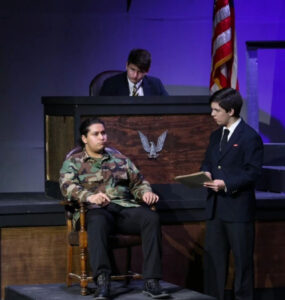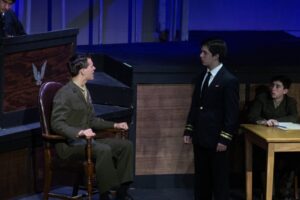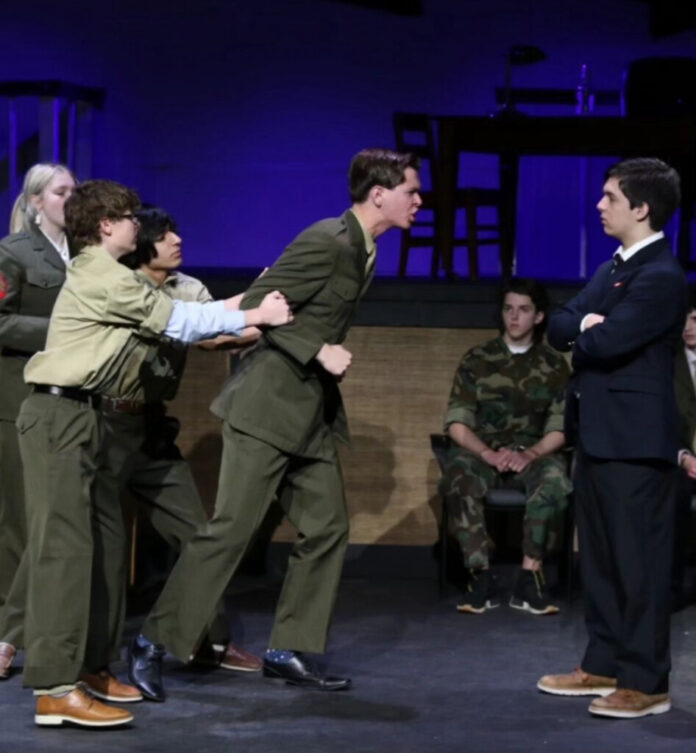“I thought that this play represents the limits to duty, and when the tension between one’s moral compass and obligations break, and our characters have to make a choice.” These were the words used to describe Jesuit’s recent play, A Few Good Men, by Jesuit’s Theater Director Mr. Chris Patterson. The play, as described by a previous piece by newly christened staff writer Jackson Schutze, essentially is an investigation of a murdered Marine that later indicts the broader leadership structure of America’s military institutions.
As someone who had never seen the movie or play, all I knew going into the film was the infamous “You can’t handle the truth!” scene, which I had the urge to yell out in a middle school mock trial competition once, not that it would have saved me anyway. I sat down at Jesuit Melsheimer Family Theater on a Thursday evening, and was I in for a ride.
The play ties in two separate stories in two separate locations – Guantanamo Bay, Cuba, and the comforts of an east coast JAG – or Judge Advocate General – office room. A frantic Marine private by the name of William T. Santiago becomes the target of a hazing ritual gone wrong, while our protagonist Lieutenant Kaffee sips coffee and complains about court cases.

Santiago’s murderers, Private Louden Downey and Lance Corporal Harold Dawson, are arrested and Kaffee becomes their defense counsel. Kaffee initially seeks to enter into a plea bargain – something he is quite familiar with – but the arrival of an enigmatic additional defense counselor, Lt. Commander Galloway, flips the script.
At first glance, I was wondering why Kaffee and Galloway, our main protagonists, were defending the Marines who killed Santiago, until it is revealed that this was not an isolated hazing incident, it was sanctioned by the senior Marine leadership structure. Santiago had been desperately trying to leave his miserable post, and was failing on several PT tests. To “toughen the boy up,” Marine Colonel Jessup orders a “Code Red” to essentially haze the poor private into adapting to the Corps.
Granted, this revelation occurs very slowly and with time to develop the characters of Kaffee, Galloway, Dawson, and the Colonel. Kaffee is an intellectually talented but timid (and lazy) JAG officer who defaults to plea bargains for his defendants rather than offering a fight for innocence. Galloway is a naive and inexperienced attorney, who while being relatively unaccomplished nobly forces Kaffee to not only uphold his duty as defense counsel but also get to the bottom of Santiago’s death.
I won’t go any deeper into the story, but I’ll comment on the rest of the Jesuit production’s atmosphere and the character’s personalities. Jesuit Stage and Theater did a great job with the set design (as usual) with it being both visually authentic and space efficient. The Marine marching drills cadence, as the stage crews repositioned props and designs, was great to hear, and reinforces the martial atmosphere, with no love or compassion present in these servicemembers lives.
The acting was also impressive, and everyone fit their roles perfectly. Kaffee, played by Jace Petrusas and Jackson Farragut, embodied the once laid-back and carefree officer being forced into fulfilling his responsibilities as an advocate for a hopeless cause. Ursuline actors Fia Bray and Emma Oscherwitz acted Lt. Commander Galloway’s naivety and innocence well, and the interactions with Kaffee stand out in the play to provide character development for Lt. Kaffee.
Sam Weinberg, played by Roberto Hernandez-Hoffman and Charlie Fent, provides much-needed comic relief to the at times morbid show. Harold Dawson, played by Richard Stanford and Sam Carley, represents a Marine fixated on duty and ready to take the blame for the murder of Santiago, yet over time becomes willing to surrender himself to a higher duty: a duty to the law and to human dignity.
Captain Markinson, one of the few Marine officers portrayed in a positive light, was played by Oliver Camu and Wills Blosser. Markinson, like Dawson, realizes that his duty may lie to his superior officer, yet it also lies to his fellow Marine’s safety as well, even at a terrible cost. In my opinion, his character was the tragic hero of our story. “Know that your son [William Santiago] is dead for only one reason. I wasn’t strong enough to stop it,” states Markinson towards the end of the play.
Lt. Kendrick, played by Evan Velasquez and Kiko Medrano, embodies the opposite of Markinson – sadistic, ruthless, and borderline fanatic. He has no mercy towards his subordinates and eagerly obeys Colonel Jessup’s motto of “Unit, Corps, God, Country.”
Finally, our last main character is Colonel Jessup, played by Jackson Schutze and Daniel Brannon, who in the words of the former “has to embody the sense of superiority and control he has over every situation. The only time he is surprised is at the end when he is arrested, for most of the film he directs the system. He’s also very stubborn with his morals and won’t let anyone push him back from that.”
Jessup is the owner of that infamous line, and Schutze and Brannon embodied his wiry demeanor. “Whenever I get to raise my voice and be emotional in my acting career it always is a high moment for me,” said Schutze.
It helped that the characters were arrayed in a wide variation of costumes, from Marine Jungle fatigues to Service and Dress Blue uniforms. Again, it adds to the atmosphere of the military’s imposing structure and values. Just as the uniforms represent the rigidity and order of the Marines, so too are their mental attitudes and expectations toward others.

Speaking about his favorite moment of the play, Jackson Schutze said:
“My favorite moment was his final monologue, where he defends his viewpoint and decision-making for calling the Code Red. The buildup to his infamous quote, ‘You can’t handle the truth!’ is immaculate, because it’s him being cocky as usual, and then him finally breaking. He can’t stand the heat anymore, and it’s all over.”
But as the play goes on, Kaffee and Galloway get to the root of the murder case, and it ends up challenging the highest level of military command. The quote at the beginning of this article was from Mr. Patterson in the play’s booklet that outlined his interpretation of the movie and the play’s meaning. Does one commit themselves to the rigid structure of command, or do they owe loyalty to themselves only?
“The lengths that Jessup went to were too far attached from my situation, but it is a good lesson on how to interpret orders,” says Schutze, “Jessup tells us how far a person can become entitled and with no way to conform to even the slightest change in routine, which Santiago was. Santiago was not going to adapt, he had to get out, but Jessup got too brash and fixated. Then again, you want to be in that middle ground, don’t be too strict and rigid but you also need to have some sense of community and a willingness to do your job, unlike how we saw Kaffee in the play’s beginning.
Jace Petrusas said the following about his role as Lt. Kaffee:
“Playing Kaffee in A Few Good Men was a dream come true. Ever since my parents showed me the movie about 2 years ago, I have always wanted to try my hand at this iconic character. I really think this show was fantastic and I could not be more thankful to my cast mates and Mr. Patterson.”
Additionally, Mario Jaar filled the role as student director, essentially being co-director alongside Mr. Patterson. Jaar gave character advice to actors, did sound design, and assisted with photographing.
A Few Good Men makes for a good courtroom drama, and the set, atmosphere, and acting of the Jesuit and Ursuline students was on its own spectacular, but the deeper moral dilemmas present with the story make it, at least for me, a rewatch waiting to happen. I’ll probably have to watch the movie, but I don’t think that will fully replicate the energy I saw on that stage on that Thursday night.

Stay tuned to the Roundup for more coverage on Stage and Film!






